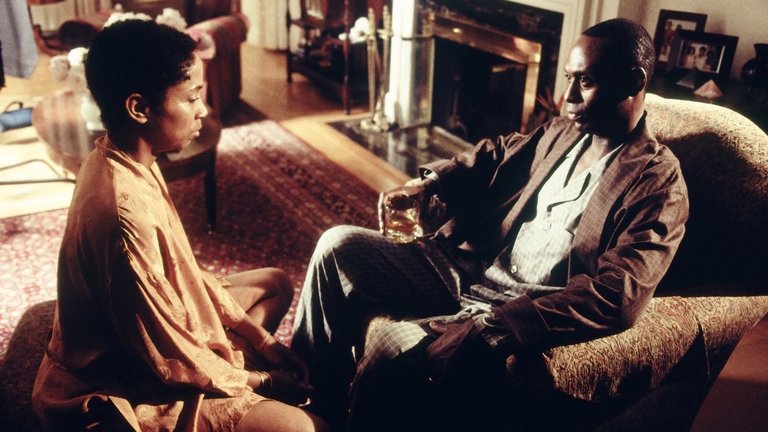Television Review: Lessons (The Wire, S1X08, 2002)

Lessons (S01E8)
Airdate: July 21st 2002
Written by: David Simon
Directed by: Gloria Muzio
Running Time: 56 minutes
Television history is littered with episodes whose significance evolves long after their initial broadcast, reshaped by the cruel hindsight of real-world events. The Wire’s seventh episode, Lessons, stands as a particularly chilling case study. Airing in 2002, it introduced the series’ most iconic line—Omar Little’s razor-sharp warning, “Come at the king, you best not miss”—while weaving a narrative strand so disturbingly prescient of the Jeffrey Epstein scandal that it now feels less like fiction and more like a forensic blueprint of systemic corruption. David Simon, ever the prophet in the guise of a journalist, crafted an episode that dissects how power protects itself through calculated indifference, sexual exploitation, and the weaponisation of legal institutions—a dynamic that would define headlines two decades later. Lessons is not merely a pivotal chapter in The Wire; it is a time capsule of truths we refused to see until it was too late.
The episode’s central crisis emerges from the task force’s dogged pursuit of the Barksdale organisation—a pursuit that nearly collapses under the weight of its own success. Detectives Herc and Carver, acting on wiretap intelligence, arrest Damien “Day Day” Price, a driver for State Senator Clay Davis, after he collects $20,000 from Barksdale’s coffers. What begins as a routine drug bust detonates into political dynamite: Davis is a kingmaker, and his exposure threatens the delicate ecosystem of Baltimore’s power brokers. Deputy Commissioner Burrell, ever the institutional survivor, moves to shut down the entire investigation, declaring it “too hot” for the department’s fragile political equilibrium. Only Judge Phelan’s intervention—a reminder that the judiciary’s power trumps police politics—saves the operation. This sequence is The Wire at its most urgent: a masterclass in how investigations targeting street-level crime inevitably collide with the machinery of elite impunity. The parallel to the Epstein affair is uncanny. Just as Burrell fears Davis’s exposure would “destroy careers,” so too did Epstein’s “client list” threaten to unravel networks of influence across politics, finance, and royalty. Simon understood decades ago what the world would only grudgingly admit in 2019: when power and predation intertwine, the law becomes a shield, not a sword.
Yet the episode’s most harrowing prescience lies in its depiction of Orlando’s strip club—a front for Barksdale’s operations. When D’Angelo Barksdale carelessly reveals plans of its formal owner Wendell „Orlando” Blocker (Clayton LeBouef) to go independent and try his hand in drug business, Blocker is brutally beaten. More chillingly, stripper Keisha Michaels (Shaneera Lawson-Smith) dies of an overdose at a party attended by Barksdale enforcers. D’Angelo’s discomfort upon discovering her body—a moment of moral unease in a world of casual cruelty—hints at the transactional horror beneath the surface. The club is not merely a business; it is a node in a network where vulnerable women are currency, and powerful men operate with impunity. Simon frames Keisha’s death not as a tragedy but as business as usual—a detail so casually delivered it mirrors the real-world indifference that allowed Epstein’s trafficking empire to flourish for decades.
Lessons also crystallises The Wire’s thesis through Omar Little’s iconic declaration. After Barksdale’s crew torched his van, Omar ambushed and killed Stinkum Artis while wounding Wee-Bay (Hassan Johnson)—a retaliation that jeopardises the task force’s case. When pressed by detectives, Omar delivers his legendary line, framing his violence as a logical consequence of Avon’s hubris: “Come at the king, you best not miss.”This is not mere bravado; it is a street-level articulation of systemic lawlessness. The line’s ubiquity in modern discourse—from political commentary to social media—proves its universality: in any corrupt hierarchy, challenging power without finishing the job is suicide.
Simon further deepens his critique through subtle character revelations that expose the porous boundary between criminality and legitimacy. McNulty’s reckless recruitment of his young sons to tail Stringer Bell in a supermarket—resulting in the discovery that Stringer attends community college economics classes—epitomises the show’s genius. Stringer, the pragmatic strategist of the Barksdale empire, embodies the episode’s central irony: even those seeking redemption within the system (like Stringer’s bid for legitimate business) are crushed by its inertia. His plea to Avon to cease the vendetta against Omar falls on deaf ears, foreshadowing the organisation’s downfall through Avon’s emotional myopia. Meanwhile, McNulty’s parental negligence underscores how the job consumes every facet of life, blurring the lines between dedication and self-destruction.
Even the episode’s lighter moments serve its grim thesis. Herc and Carver’s farcical attempts to pass the sergeant’s exam highlight how institutional priorities pervert purpose. Similarly, McNulty’s cover-up of Bunk’s extramarital affair (and subsequent chaos when Bunk burns his clothes to hide evidence) is classic Wire dark comedy: a reminder that the personal and professional are inextricably entangled in a broken system. These scenes are not diversions but lessons in institutional absurdity—the trivial distractions that enable larger failures.
Yet Lessons transcends its era because it refuses to offer easy answers. The task force survives Burrell’s purge, but only through Phelan’s political leverage—a reminder that justice here is transactional, not moral. Omar’s testimony remains compromised; Keisha’s death is all but ignored; and the club’s exploitation continues. There is no catharsis, only the grinding reality that power adapts but never surrenders. When Simon later claimed The Wire was about “the American city and how we live together,” Lessons proves he meant it as a warning. The Epstein scandal did not emerge from a vacuum; it was the logical endpoint of systems Lessons dissected with surgical precision: the commodification of the vulnerable, the collusion of institutions, and the myth of accountability.
RATING: 7/10 (+++)
Blog in Croatian https://draxblog.com
Blog in English https://draxreview.wordpress.com/
InLeo blog https://inleo.io/@drax.leo
InLeo: https://inleo.io/signup?referral=drax.leo
Leodex: https://leodex.io/?ref=drax
Hiveonboard: https://hiveonboard.com?ref=drax
Rising Star game: https://www.risingstargame.com?referrer=drax
1Inch: https://1inch.exchange/#/r/0x83823d8CCB74F828148258BB4457642124b1328e
BTC donations: 1EWxiMiP6iiG9rger3NuUSd6HByaxQWafG
ETH donations: 0xB305F144323b99e6f8b1d66f5D7DE78B498C32A7
BCH donations: qpvxw0jax79lhmvlgcldkzpqanf03r9cjv8y6gtmk9